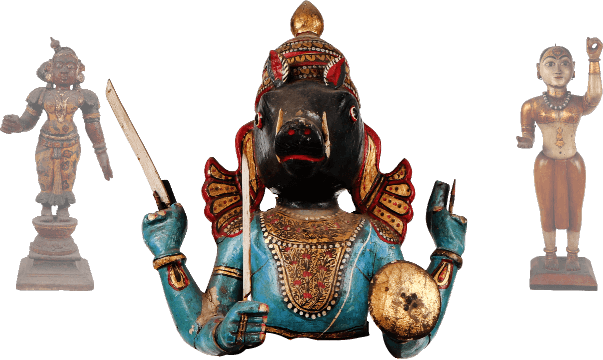Title : Horse Rider
Accession No : 81.7.6353
This is a figure of horse rider. The front two legs of the horse have been joined. The figure sitting on horseback is depicted as a warrior. The horse has been decorated with metal.
Gallery


Source
- RepositoryNational Crafts Museum and Hastkala Academy
- CollectionMuseum Collection
Provenance
- CountryIndia
- StateGujarat
Period
- Start DateEarly 20th century
Condition
- ConditionPoor
- RemarksMissing Parts, Damaged
Dimensions
- Measurement (CMS)19 X 16 X 7
- Weight (GRMS)0.00
Significance
- Artistic"Dhokra (also spelt Dokra) is non–ferrous metal casting using the lost-wax casting technique. This sort of metal casting has been used in India for over 4,000 years and is still used. The product of Dhokra artisans is in great demand in domestic and foreign markets because of its primitive simplicity, enchanting folk motifs and forceful form. Dhokra horses, elephants, peacocks, owls, religious images, measuring bowls, lamp caskets etc., are highly appreciated. The Dhokras use lost-wax process to cast hollow brass objects and images. A replica of the desired product is made with wax on a clay core, with all its finer details of designs and decorations. Brass scrap is generally used as raw material. Crafted out of metal through indigenous methods, the distinctive design and form of Dhokra craft reflects the inherent expression of their feelings. It was used to make everything from making jewellery to vessels to images of gods, goddesses, animals and birds."
Description
- DescriptionThis is a figure of horse rider. The front two legs of the horse have been joined. The figure sitting on horseback is depicted as a warrior. The horse has been decorated with metal.
- Inscription/Markings No
- ReferenceS.D. Trivedi, U.C. Dwivedi, ed. Metallic Art of India. New Delhi: Sharda Publishing House, 2009.
- KeywordHorse Rider, Legs Joined, Horse Back, Warrior

